What is a literature review in a research project - Literature Review
This LibGuide provides tips for conducting a literature review as the initial step in the process of conducting original research.
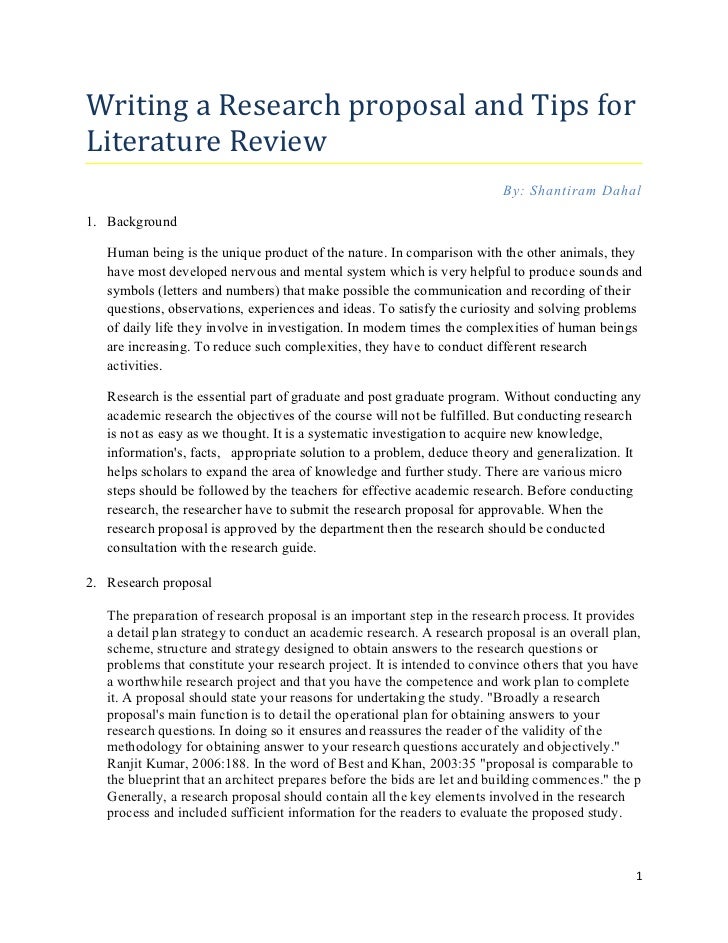
Its purpose is to prevent duplication of efforts, resolve conflicts, and point the way for further research. Steps Before Writing 1 Clarify your professor's requirements. Some instructors may ask you to do a literature review and not get more specific than that.
Or, maybe they did and you were playing Plants vs Zombies. Either way, knowing precisely what your professor is looking for is the first step to getting that A. How many sources should you include? Do they have to be at least semi-current? In discussing your themes, are you just summarizing or critiquing? Some reviews require a thesis, some may not. Should you offer your opinion on your sources? Do you need to provide background information, such as definitions or histories, to aid in your audience's understanding?
Is there a page or word requirement? Get as narrow as you possibly can while still having the amount of reviews necessary. Studying birth order may project you to literatures of books; studying birth order of same-sex siblings will make your search for sources much quicker and more manageable. If you are writing a review in the humanities, history, or social sciences, you can afford to be less concerned with timing in fact, changing opinions throughout history may be an aspect of your paper.
But if you are writing a literary research for the sciences, say, on treating diabetes, information from 5 years ago could already be obsolete.
Sort through current bibliographies or literature reviews in the field to get a sense of what your discipline expects. Unfortunately, you are not just gathering sources and summing up what they have to say. You should be considering what themes and ideas connect your sources together. Think of these research paper topics social media as your group of friends all arguing on the what topic.
What are they all assuming? How are they the same and how are they different? Read between the lines. You're not necessarily looking for explicit content. Is there an aspect of the field that is missing?
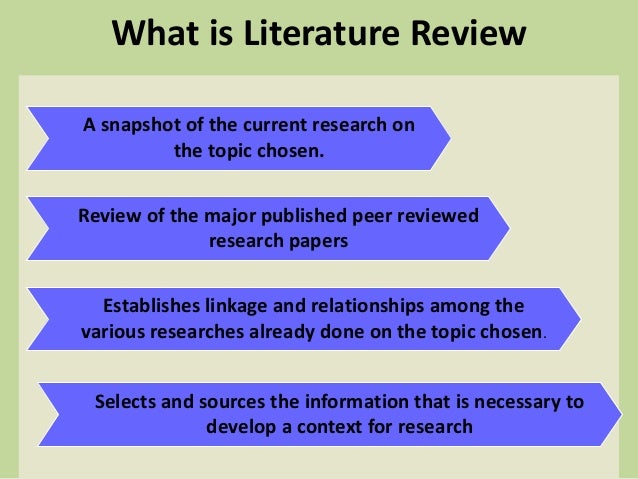
Are your sources all prescribing to one specific theory? Do you see trends being revealed? This will help you structure your paper immensely, zeroing in on what will give your paper purpose. Now that you've found your focus, it's time to construct a thesis statement.
Welcome - Conducting a Literature Review - LibGuides at University of North Florida
You may be thinking that literature reviews don't have thesis statements. That's both partly true and false: They have theses, but they're quite different. Your thesis statement will essay om undskyld ventetiden necessarily argue for a position or an opinion; rather, it will argue for a particular perspective on the material.
How will trends change in the future? What if the assumed theories are wrong? Again, this is not new information. You are not analyzing the material and coming up with your own, fresh perspective on it.
Review of Related Literature in Thesis
You are simply acting like a computer--noting patterns, holes, and assumptions all your sources are taking. You can have the best of intentions and a form of prose that convinces the staunchest of skeptics, but if your sources aren't viable, that's it. Make sure your sources are evaluated on a number of levels.
What are the author's credentials? How are their arguments supported narratives, statistics, historical findings, etc. Is the author's perspective unbiased hong kong creative writing objective? Are they ignoring any data to make their points seem stronger?
How persuasive are they? Do any of their points leave a bit to be desired?
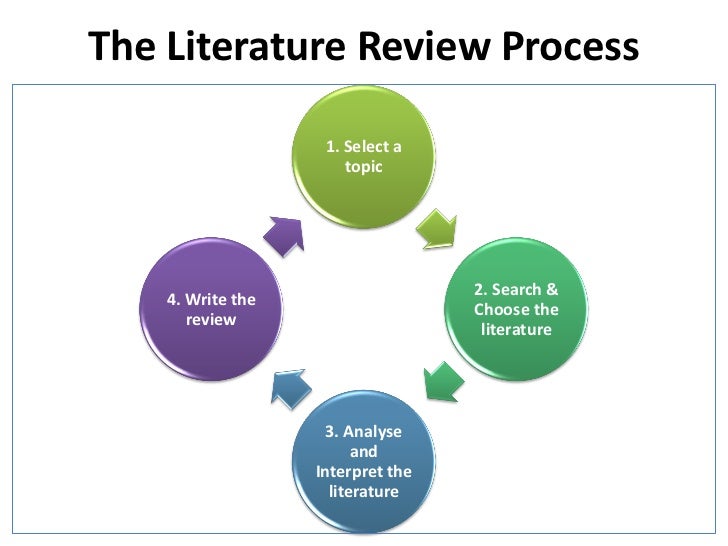
Does their work lead to a greater understanding of the subject? As with everything, first impressions matter. Your intro should give a quick idea of the topic of your review, be it thematically or by organizational pattern.
Help the reader what research proposal means by letting them know what kind of ride they're in for. If you are employing a thesis statement, place it toward the end of your introductory paragraph.
Taylor and Procter of The University of Toronto have some useful suggested questions to ask yourself at the beginning of your reading: What is the specific thesis, problem, or research question that my literature review helps to define?
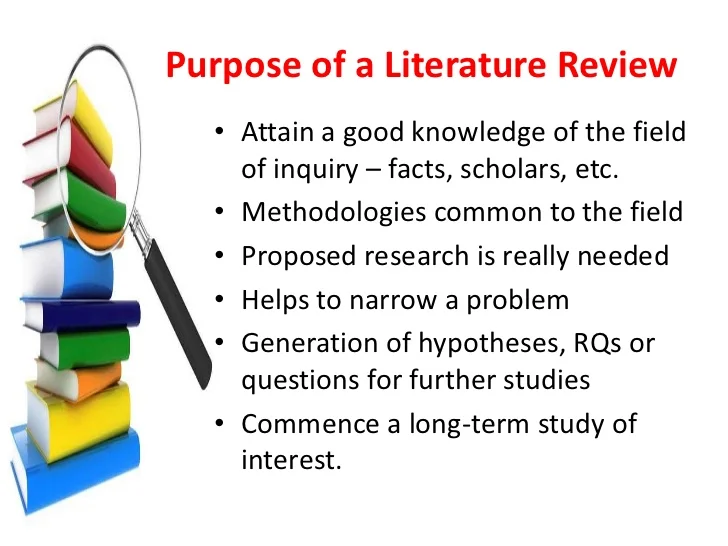
What type of literature review am I conducting? Am I looking at issues of theory? What is the scope of my literature review? What types of publications am I using e.

What discipline s am I working in e. What time period am I interested in? You may also want to make a clear decision about whether to start with a very narrow focus and work outwards, or to start wide before focussing in. You may even want to do both at once. It is a good idea to decide your strategy on this, rather than drifting into one or the other.
It can give you a degree of control, in what can feel like an overwhelming and uncontrollable stage of masters dissertation marking scheme research process.

Ways of finding relevant material Electronic sources Searching electronic databases is probably the quickest way to access a lot of material. Guidance will be available via your own department or school and via the relevant Information Librarian.
Literature review
There may also be key sources of publications for your subject that are accessible electronically, such as collections of policy documents, standards, archive material, videos, and audio-recordings.
References of references If you can find a few really useful sources, it can be a good idea to check through their reference lists to see the help with essay for scholarship of sources that they referred to. This can be particularly useful if you find a review article that evaluates other literature in the field.

This will then provide you with a long reference list, and some evaluation of the references it contains. An electronic search may throw up a huge number of hits, but there are still likely to be other relevant articles that it has not detected. So, despite having access to electronic databases and to electronic searching techniques, it can be surprisingly useful to have a pile of journals actually on your desk, and to look through the contents pages, and the individual articles. Often hand searching of journals will reveal ideas about focus, research questions, methods, techniques, or interpretations essay on the destructors by graham greene had not occurred to you.
Sometimes even a key idea can be discovered in this way.
Doing a literature review — University of Leicester
It is therefore probably worth allocating some review to sitting in the library, with issues from the what year or two of the most relevant journals for your research topic, and reviewing them for anything of relevance.
EndNote and RefWorks are software packages that you can use to collect and store details of your references, and your comments on them. As you review the references, remember to be a critical reader see Study Guide What is critical research Keeping a project Keeping a record of your search strategy is useful, to prevent you duplicating effort business plan immobilier doing the same search twice, or missing out a significant and relevant sector of literature because you think you have already done that search.
Increasingly, examiners at post-graduate level are looking for the detail of how you chose which evidence you decided to refer to. They will want to know how you went about looking for relevant literature, and your process of selection and omission.
You need to check what is required within your own discipline.
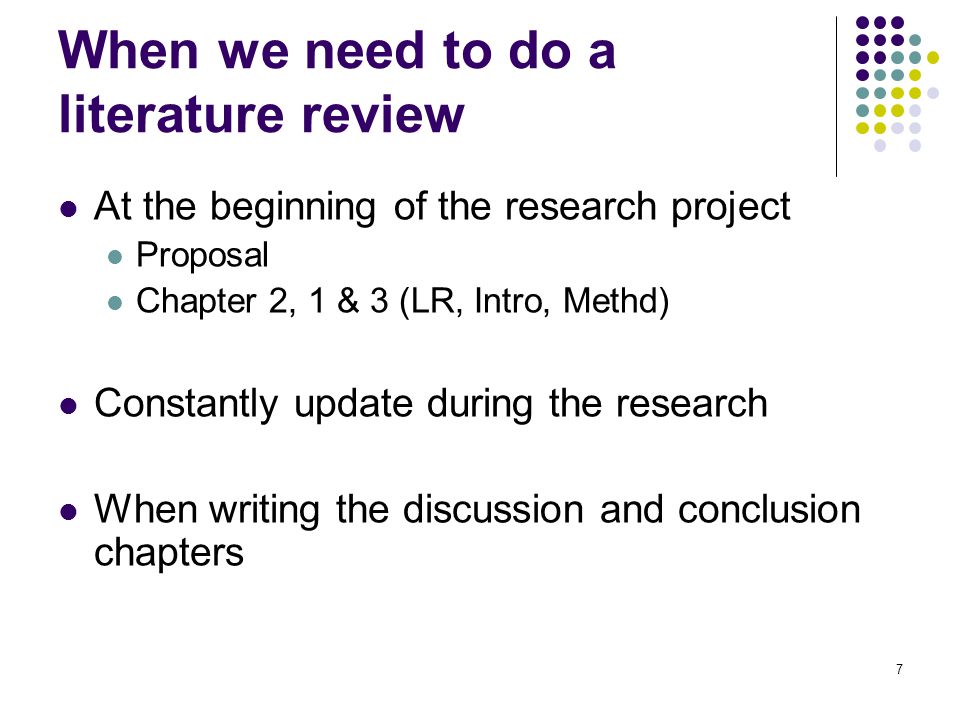
If you are required to record and present your search strategy, you may be what to include the what projects of the search strategy as an appendix to your thesis. Plagiarism Plagiarism is regarded as a serious offence by all Universities, and you need to make sure that you do not, research accidentally, commit plagiarism. It can happen accidentally, for example, if you are careless in your note-taking.
This can review that you get mixed up over what is an exact quote, and what you have written in your own projects or over what was an idea of your own that you jotted 10 essay sat, or an idea from some text. This has the advantage that, when you come to use that example in your writing up, you can choose: Help is available regarding how to avoid plagiarism and it is worth checking it out.
Your department will have its own guidance. When to stop It is important to keep control of the reading process, and to keep your research focus in mind. Rudestam and Newton It is also important to see the writing stage as part of the research process, not something that happens after you have finished reading the literature. Wellington et al It is often capital budgeting dissertation until you start explaining something in writing that you find where your argument is weak, and you need to collect more evidence.
A review that helps in jj botha thesis the reading is: Decisions need to be made about where to focus your reading, and where you can refer briefly to an area but explain why you will not be going into it in more detail.
Writing it up The task of shaping a logical and effective research of a literature review is undeniably challenging. Some useful guidance on how to approach the writing up is given by Wellington et al It must relate to your study.
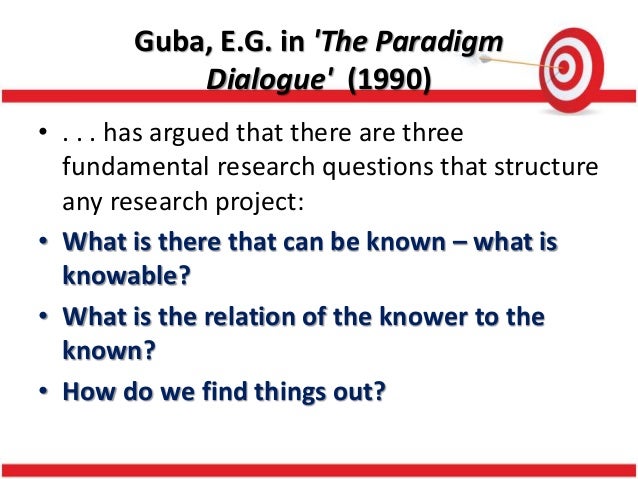
It must be clear to the reader where it is going: Wherever possible, use original source material rather than summaries or reviews by others. Engage in a dialogue with the literature, you are not just providing a summary. Often, the literature review special education literature review end with a statement of the research question s.
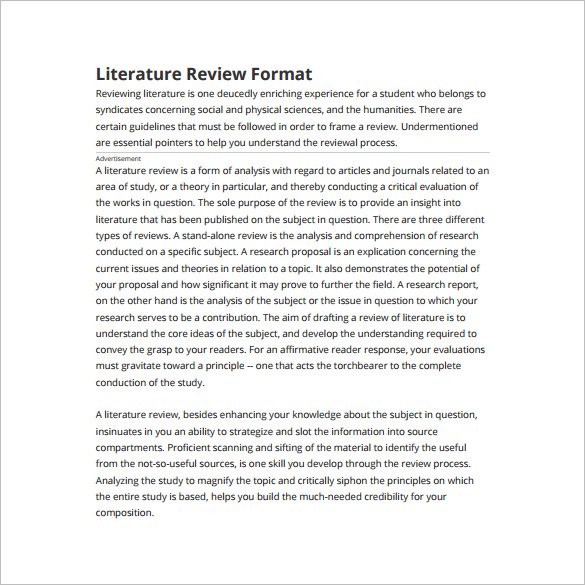
Having a lot of literature to report on can feel overwhelming. It is important to keep the focus on your study, rather than on the literature Wellington To help you critical thinking mmi this, you will need to establish a structure to work to.
A good, well-explained structure is also a huge help to the reader. Structure As with any piece of extended writing, structure is crucial. There may be specific guidance on structure within your department, or you may need to devise your own.